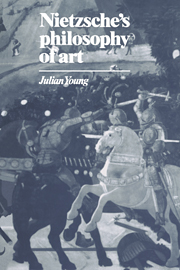3 - Human, All-too-human
Published online by Cambridge University Press: 18 November 2009
Summary
1 At about the time Richard Wagner at Bayreuth appeared Nietzsche began work on Human, All-too-human, which he published in the spring of 1878. In 1886 it was republished as volume I of a work with that same title, volume II comprising Assorted Opinions and Maxims, first published in 1879, and The Wanderer and his Shadow of 1880. This body of material, together with Dawn (1881), is the topic of this chapter. Accordingly, the chapter falls into four parts: in the first (sees. 2–13) I discuss Human, All-too-human (to avoid confusion I shall refer only to the work of 1878 under that title); in the second (sees. 14–22) Assorted Opinions and Maxims; in the third (sees. 23–5) The Wanderer and his Shadow, and in the fourth (sees. 26–9) Dawn.
2 Human, All-too-human is subtitled A Book for Free Spirits. The foremost spirit thus referred to is, he explains in Ecce Homo, himself: the book, he says, is a work of liberation, the work in which “I liberated myself from that in my nature which did not belong to me” (EH VI, I). Emotionally, the book marks his “liberation” from Wagner, his first “coming out” as a non- indeed anti- Wagnerite. Though the last meeting between the two had occurred eighteen months prior to its publication, the devastatingly deflationary portrait of the artist posing as romantic, prophetic, quasi-priestly “genius” (Wagner, that is, in all but name) which, as we will see, the work contains, placed the rupture between the two beyond repair.
- Type
- Chapter
- Information
- Nietzsche's Philosophy of Art , pp. 58 - 91Publisher: Cambridge University PressPrint publication year: 1992



